
Case involved an investigation into alleged unauthorised disclosure of internal email accounts

The High Court has clarified the Independent Broad-based Anti-corruption Commission's (IBAC) procedures for reporting on investigations.
The High Court’s decision in AB (a pseudonym) v Independent Broad-based Anti-corruption Commission [2024] HCA 10 dealt with the procedures IBAC followed during its investigation into alleged unauthorised access to and disclosure of internal email accounts within a public body, as defined under the IBAC Act.
The case originated from an investigation by IBAC between 2019 and 2021 into these allegations involving “CD,” a registered organisation under the Fair Work (Registered Organisations) Act 2009 (Cth), and “AB,” a senior officer of CD and an employee of the said public body. Throughout the investigation, IBAC examined AB in a private setting.
The controversy arose when IBAC furnished AB with a draft of its special report, which contained adverse findings related to unauthorised access and disclosure of information and findings concerning the workplace culture within the public body. The appellants sought judicial review, claiming that IBAC failed to provide a "reasonable opportunity" to respond to the adverse findings as required by section 162(3) of the IBAC Act, violating procedural fairness.
The High Court, upon reviewing the appeal, clarified the interpretation of "adverse material" within the context of the IBAC Act, distinguishing it from the adverse findings themselves. The court underscored the importance of procedural fairness, ruling that IBAC must provide individuals with a chance to respond to the evidentiary material justifying adverse comments or opinions before their inclusion in a report.
Despite the High Court's clarification, most of IBAC's reporting procedures were found to comply with the act, except for one particular adverse comment. The High Court acknowledged an undertaking by IBAC not to include the contentious comment in its report to Parliament, thereby resolving the immediate dispute.
The court emphasised the necessity for investigative bodies to ensure that individuals have a fair opportunity to respond to adverse material. The court also delineated the scope of "adverse material" regarding procedural fairness in the context of IBAC's reporting obligations.
The court clarified the standards IBAC and similar bodies must meet when including adverse comments or opinions in their reports, ensuring that affected parties can contest the material underlying such adverse conclusions. Ultimately, the High Court's ruling highlighted the procedural rights of individuals implicated in IBAC's investigations. The court reinforced the principles of fairness and accountability within the operations of public sector watchdogs.